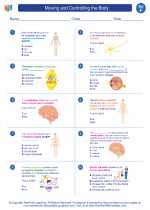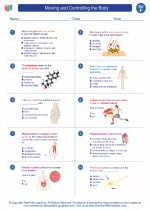Nerves
Nerves are part of the body's nervous system, which is responsible for transmitting signals between different parts of the body. The nervous system is divided into the central nervous system, which includes the brain and spinal cord, and the peripheral nervous system, which consists of the nerves that extend from the central nervous system to the rest of the body.
Anatomy of a Nerve
A nerve is made up of specialized cells called neurons, which are the basic units of the nervous system. Neurons have a cell body, dendrites that receive signals from other neurons, and an axon that transmits signals to other cells. The axon is covered by a myelin sheath, which helps to insulate and protect the nerve fiber.
Types of Nerves
There are three main types of nerves in the human body:
- Sensory Nerves: These nerves carry signals from the sensory organs to the brain, allowing us to perceive sensations such as touch, temperature, and pain.
- Motor Nerves: These nerves transmit signals from the brain to the muscles, allowing us to move and carry out voluntary actions.
- Autonomic Nerves: These nerves control involuntary functions such as heart rate, digestion, and breathing.
Function of Nerves
Nerves play a crucial role in coordinating and regulating the body's activities. They enable communication between different parts of the body, allowing for sensory perception, movement, and the maintenance of internal balance (homeostasis).
Study Guide
To study nerves effectively, it's important to understand the structure and function of neurons, the types of nerves in the body, and their roles in sensory perception, movement, and autonomic functions. Here are some key points to focus on:
- Describe the structure of a neuron, including the components of the cell body, dendrites, and axon.
- Explain the role of myelin in insulating nerve fibers and speeding up signal transmission.
- Differentiate between sensory, motor, and autonomic nerves, and provide examples of their functions.
- Discuss the importance of nerves in sensory perception, voluntary movement, and involuntary bodily functions.
- Explore how damage or disease affecting nerves can impact sensory, motor, and autonomic functions.
By mastering these concepts, you'll gain a solid understanding of the role of nerves in the nervous system and their significance in maintaining overall health and functionality.
.◂Science Worksheets and Study Guides Sixth Grade. Moving and Controlling the Body

 Worksheet/Answer key
Worksheet/Answer key
 Worksheet/Answer key
Worksheet/Answer key
 Vocabulary/Answer key
Vocabulary/Answer key
 Vocabulary/Answer key
Vocabulary/Answer key
 Vocabulary/Answer key
Vocabulary/Answer key
